The tech sector is its own animal. And to remain relevant, companies like Facebook Inc (NASDAQ:FB) spend billions of dollars buying start-ups. It turns out that, for investors, these “acquisition-hungry” companies are also a buy.
M&A
Purchasing companies is the quickest method to buying innovation, but it must be done with care. Research suggests that 70% of all mergers or acquisitions fail. However, acquisitions can still reap great reward because the integration of another company can help build out existing product lines, expand into new markets, and ensure relevance.
Tech M&A data for Q1 2013 presented a bleak picture. According to PWC’s report, U.S. Technology M&A Q1 2013, transaction values for the first and last quarter of 2012 were $29 million and $21 million, respectively. However, in Q1 2013 there was only $8 million in total deal value, and the two largest sectors by deal value were the software and Internet sectors. But activity is expected to pick up – according to PWC’s Technology M&A 2013 Report, the focus of M&A activity will begin to shift to mobile, social, analytics, and security.
Rich opportunity is on the horizon. The following firms have storied acquisition histories, so look for them to be the big players in buyouts.
3 companies using acquisitions
Yahoo! Inc. (NASDAQ:YHOO)
Since Marissa Mayer took the helm, Yahoo! Inc. (NASDAQ:YHOO) has jumped more than 70%. Mayer nixed work-at-home policies and also implemented an aggressive acquisition strategy. From the time Mayer was appointed CEO of Yahoo! Inc. (NASDAQ:YHOO) until now, there have been 11 acquisitions. Recent acquisitions include Tumblr, Summly, and most recently PlayerScale. Yahoo! Inc. (NASDAQ:YHOO) also made an official bid for Hulu, the free and pay-for-premium online video streaming service. Since 1997, Yahoo has acquired a total of 78 companies. Of the 78, 10 occurred in 2013. Of those 10, six occurred in May. Clearly, Yahoo! Inc. (NASDAQ:YHOO)’s acquisition strategy is gaining momentum.

In total, Facebook Inc (NASDAQ:FB) has acquired 36 companies. It has capitalized on the mobile movement by acquiring eight companies and has integrated them successfully into its mobile unit. Parse was Facebook Inc (NASDAQ:FB)’s most recent mobile-oriented purchase, and it previously placed a bid to purchase Waze, a free mobile GPS app.
With its key acquisitions in mobile, I think Facebook Inc (NASDAQ:FB) is slowly transitioning from a social networking company to a mobile advertising company. Facebook’s transition is important because it shows that the company is creating ways to monetize its growing base of users who access Facebook Inc (NASDAQ:FB) via mobile.

Microsoft Corporation (NASDAQ:MSFT)
Through effective acquisitions, Microsoft Corporation (NASDAQ:MSFT) achieved a market cap above $280 billion. Including its first acquisition in 1987, Forethought, Microsoft Corporation (NASDAQ:MSFT) has purchased a total of 158 companies. Its purchase history is filled with success stories. For example, Forethought evolved into PowerPoint. Despite its successes, Microsoft Corporation (NASDAQ:MSFT) has to continue to search for innovation so that it can continue to compete with both mobile competitors like Nokia and computing competitors like Apple. But with years of experience and $6.9 billion in cash, Microsoft Corporation (NASDAQ:MSFT) has the essentials to continue acquiring companies and developing its future.

Corporate investing
According to data compiled by Global Corporate Venturing, there are a total of 750 corporations that currently have venture units in operation. Traditional VC firms measure success by financial return gained in the IPO or sale of a company. In contrast, corporate venture capitalists measure success by whether or not they can successfully integrate a start-up into the firm.
A few well-known examples of corporate venture capital (CVC) divisions are Google (NASDAQ:GOOG) Ventures, Intel Capital, Pfizer Venture Investments, and J&J Development Corp.
Google Inc (NASDAQ:GOOG)’s Google Ventures is an independent venture capital fund financed by Google. The fund was established on March 31, 2009 with an original capital commitment of $100 million but recently expanded to $300 million a year. Today, Google Ventures has over 150 companies in its portfolio. And in 2012, it had eight key exits to Yahoo! Inc. (NASDAQ:YHOO), Twitter, and AOL, Inc. (NYSE:AOL). Of those eight companies listed as key exits, two were bought by Google itself.
The fund is an important piece of Google Inc (NASDAQ:GOOG)’s innovation strategy because it brings in revenue from IPOs and from selling companies. But, most importantly, the fund establishes a direct link between innovative start-ups and Google Inc (NASDAQ:GOOG).

Johnson & Johnson (NYSE:JNJ)
Johnson & Johnson Development Corp (JJDC) is the venture capital subsidiary of Johnson & Johnson (NYSE:JNJ) that focuses on health care and technology venture funding. The subsidiary was established in 1973, making it one of the oldest CVCs to date. JJDC concentrates on creating growth opportunities for Johnson & Johnson. Used in sync with Johnson & Johnson (NYSE:JNJ)’s traditional portfolio and market presence, JJDC helps the firm identify new business openings and helps support the innovative process of Johnson & Johnson (NYSE:JNJ)’s operating companies. JJDC also invests in international markets and has offices in the USA, Belgium and Israel.

Doing it all
Many companies have innovative environments. Fewer have strong corporate development divisions. But even fewer have corporate venture capital subsidiaries. However, companies achieve the best results when they integrate all three innovative dynamics. So – just like the charts above illustrate – when you find a firm that is great at making acquisitions, buy in big and hold on for the (profitable) ride.
The article 5 Companies That Buy Their Innovation originally appeared on Fool.com and is written by Marie Palumbo.
Article by Santiago Rodriguez, edited by Chris Marasco. Neither has a position in any stocks mentioned. The Motley Fool recommends Facebook, Google, and Johnson & Johnson. The Motley Fool owns shares of Facebook, Google, Johnson & Johnson, and Microsoft. Marie is a member of The Motley Fool Blog Network — entries represent the personal opinion of the blogger and are not formally edited.
Copyright © 1995 – 2013 The Motley Fool, LLC. All rights reserved. The Motley Fool has a disclosure policy.






